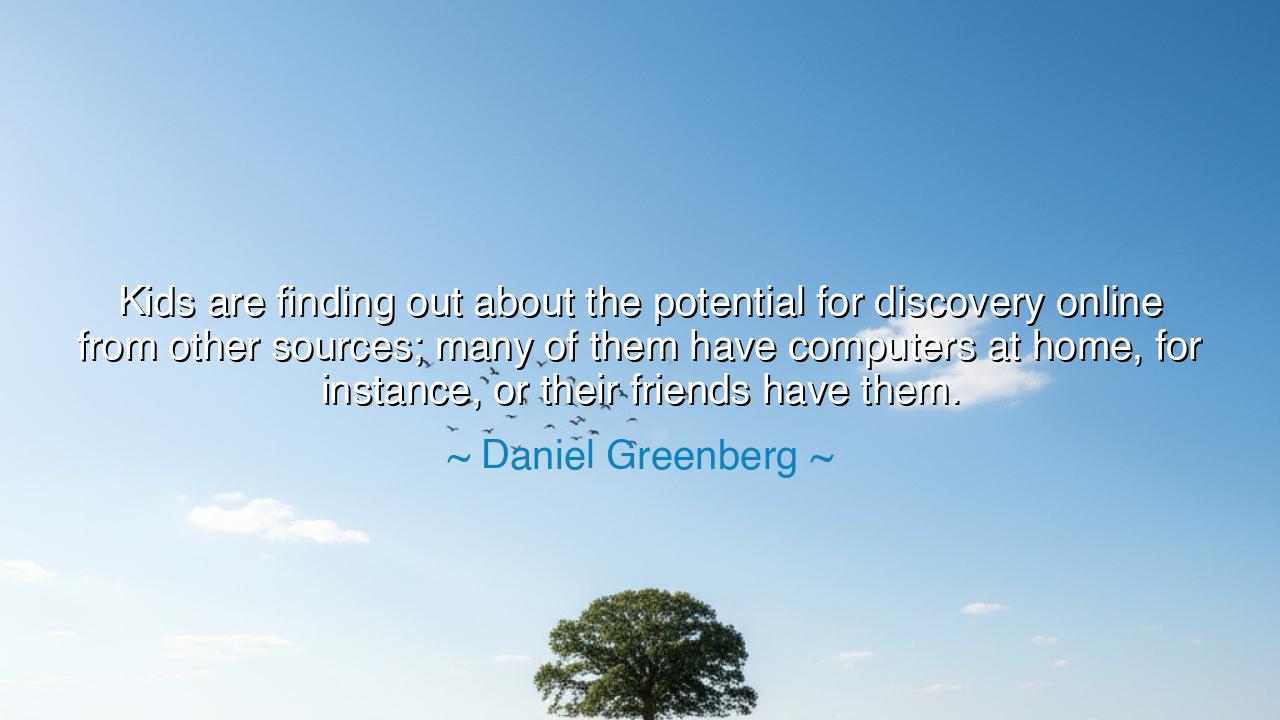
Kids are finding out about the potential for discovery online
Kids are finding out about the potential for discovery online from other sources; many of them have computers at home, for instance, or their friends have them.






“Kids are finding out about the potential for discovery online from other sources; many of them have computers at home, for instance, or their friends have them.” — in this simple yet prophetic statement, Daniel Greenberg, the educational pioneer and founder of the Sudbury Valley School, captures a turning point in human learning — the dawn of a new age where knowledge is no longer confined to walls or gatekeepers. His words, spoken in the spirit of observation rather than prediction, unveil a quiet revolution: that the young, armed not with authority but with curiosity, have begun to reclaim the birthright of learning through self-discovery.
For centuries, education was a river that flowed in one direction — from the elder to the youth, from the teacher to the taught. But in Greenberg’s time, this flow began to change. The rise of computers and the internet shattered the monopoly of formal education. Children, once bound to the narrow lessons of their schools, began to explore vast new worlds through screens — finding information not in textbooks, but in the wild expanse of the digital cosmos. Greenberg saw this not as a threat, but as a fulfillment of the truest purpose of education: the awakening of independent thought.
The potential for discovery, as he calls it, lies not in technology itself, but in the spirit that uses it. A child, guided by wonder and freed from rigid systems, learns as the explorers of old once did — through experimentation, mistake, and triumph. Greenberg’s insight reflects a deep understanding of human nature: that learning is not the filling of a vessel, but the lighting of a flame. When he speaks of children finding discovery “from other sources,” he speaks of the emancipation of the mind — the return of curiosity to its natural home.
One might recall the story of Galileo Galilei, who as a young man dared to look through his telescope and see what others refused to see. The authorities of his day forbade certain truths, but Galileo’s hunger for discovery could not be silenced. In Greenberg’s vision, the modern child is a new Galileo — not gazing at stars through glass, but into the infinite universe of the digital world, seeking knowledge that no classroom can contain. Both are bound by the same sacred impulse: the desire to know for oneself.
Yet, as Greenberg surely knew, such freedom comes with peril. The online world, vast and unfiltered, can nurture both wisdom and confusion. A mind untrained in discernment may mistake noise for knowledge, illusion for truth. Therefore, the role of the elder shifts: no longer to dictate, but to guide; not to control, but to cultivate judgment. Greenberg’s words remind us that the purpose of the teacher is not to bind curiosity, but to refine it — to teach the young how to navigate the sea of information without losing sight of the stars of truth.
His philosophy echoes the ancient Greek ideal of paideia — the shaping of the whole human being through reason, dialogue, and self-mastery. In the same way, the digital age demands not passive consumers of knowledge, but seekers of understanding. The computer, in this light, is not a distraction but a mirror: it reflects the curiosity of the one who wields it. To the lazy, it offers endless noise; to the passionate, it offers infinite discovery.
The lesson, then, is profound and timeless: knowledge belongs to the curious. The age of digital discovery does not diminish the teacher’s role, but transforms it into that of a mentor — one who helps the young find meaning amidst abundance. The wise parent or educator must not fear the computer, but instead teach discernment, patience, and the art of wonder. Encourage the child not merely to click, but to question; not merely to consume, but to create.
So remember, O listener of future generations — learning is no longer a gift bestowed, but a quest embraced. As Daniel Greenberg reminds us, the children of this age hold in their hands tools of power unimaginable to those before them. Whether they use them to waste time or to shape destiny will depend not on the machines, but on the spirit within. The task of the wise is clear: to fan the flame of curiosity and teach the young how to walk the path of discovery — not as prisoners of knowledge, but as its fearless explorers.






AAdministratorAdministrator
Welcome, honored guests. Please leave a comment, we will respond soon